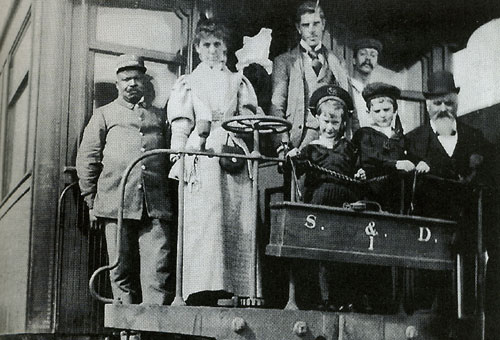Monday, November 9, 2009
George Pullman
George Pullman began his entry into Chicago's social life in 1855. It was during this time that he used his construction experience to use jacks to raise city buildings out of the mud. While raising buildings as an occupation, he began constructing the idea of a new railroad car. In 1864 he completed his work on a new, elaborate, comfortable sleeping car. He still needed to find a way to market his invention, and in the wake of tragedy, he did. He offered his luxury car to bring Abraham Lincoln's body back to Illinois. This gave him the popularity and income he needed to form The Pullman Palace Car Company in 1867. His company thrived for 10 more years until the Great Railroad Strike took hold. His rememdy, he would build a town especially for his workers to maintain happiness. He bought 3,000 acres near Calumet Lake. In 1879 construction began on the town of Pullman. By the mid 1880s, the town had expanded to contain the new factory and 1,800 buildings. All was good for quite some time, until Pullman's greed led the town to take a turn for the worst. In 1893, he fired thousands of workers, and those who he kept had to take a 25% wage cut, while still paying the same rents as always. This led to the workers instituting a strike in 1894. Widespread violence was prevalent until he was finally able to crush the strike with government help. Pullman died in 1897, more of a villain in the public eye. Over the next ten years courts ordered the sale of Pullman to its residents.
Thursday, November 5, 2009
Marshall Field

Marshall Field, became a multimillionaire by selling clothing and shoes. Marshall Field's downtown retail store was only a few miles from the city's bustling rail yards, slaughterhouses, mail-order businesses, and lumber yards. Its sheer size made it the largest retail store on earth in the late 1800s. Field employed ninety thousand workers who managed the store's fifty-three elevators, medical dispensary, post office, or telephone switchboard. When Field found out that women would leave his store at noon for lunch he put in a tea room next to the women's furs. He eventually expanded the tea room into an entire floor of posh restaurants. Men had downtown dinner and smoking clubs; Women had Marshall Field's store. Field stocked his store with fine linen handkerchiefs, silk scarves, imported parisian gloves, custom-made oriental rugs, and designer evening gowns. Marshall Field found a niche in Chicago and capitalized on it, making his name a household word by the 1870s.
Myra Bradwell.

Myra Bradwell was the first female lawyer in Illinois. She studied law on her own so she could assist her husband. Her husband was a local judge. She was the first women in the state to take the state bar exam and pass it. Bradwell was founded the Chicago Legal News. She was denied her license to practice law in Illinois when she applied to the state bar. She appealed to the Illinois State Supreme Court in 1869. The Supreme Court upheld the bar's decision and refused to grant Myra a license because "of disability imposed by...your married condition. " The court went on to state. The state said that until such disability shall be removed by legislation, the court regards itself powerless to grant your application. The "disability" the court referred to was a married woman's lack of legal standing in contracts. As long as Illinois law defined married women as residents with no legal status, the state supreme court could not give assistance to Bradwell. Myra then appealed her case to the U.S Supreme Court. The Supreme Court said " The peculiar qualities of womanhood, its gentle graces, its tender susceptibilities, its purity, its delicacy, its emotional impulses, its subordination of hard reason to sympathetic feeling are surely not qualifications for forensic strife." Bradwell despaired of gaining admittance to the bar. She went to help another Illinois woman. Alta M. Hulett, and the two women pursued a different way. They prepared a bill for the Illinois state legislature that made it illegal to deprive citizens of employment because of their gender. The legislature passed the bill. Hulett was admitted to the bar in 1873. Bradwell then turned her attention to the Chicago Legal News. The Illinois State Supreme Court granted Bradwell a license in 1890.
Subscribe to:
Posts (Atom)


